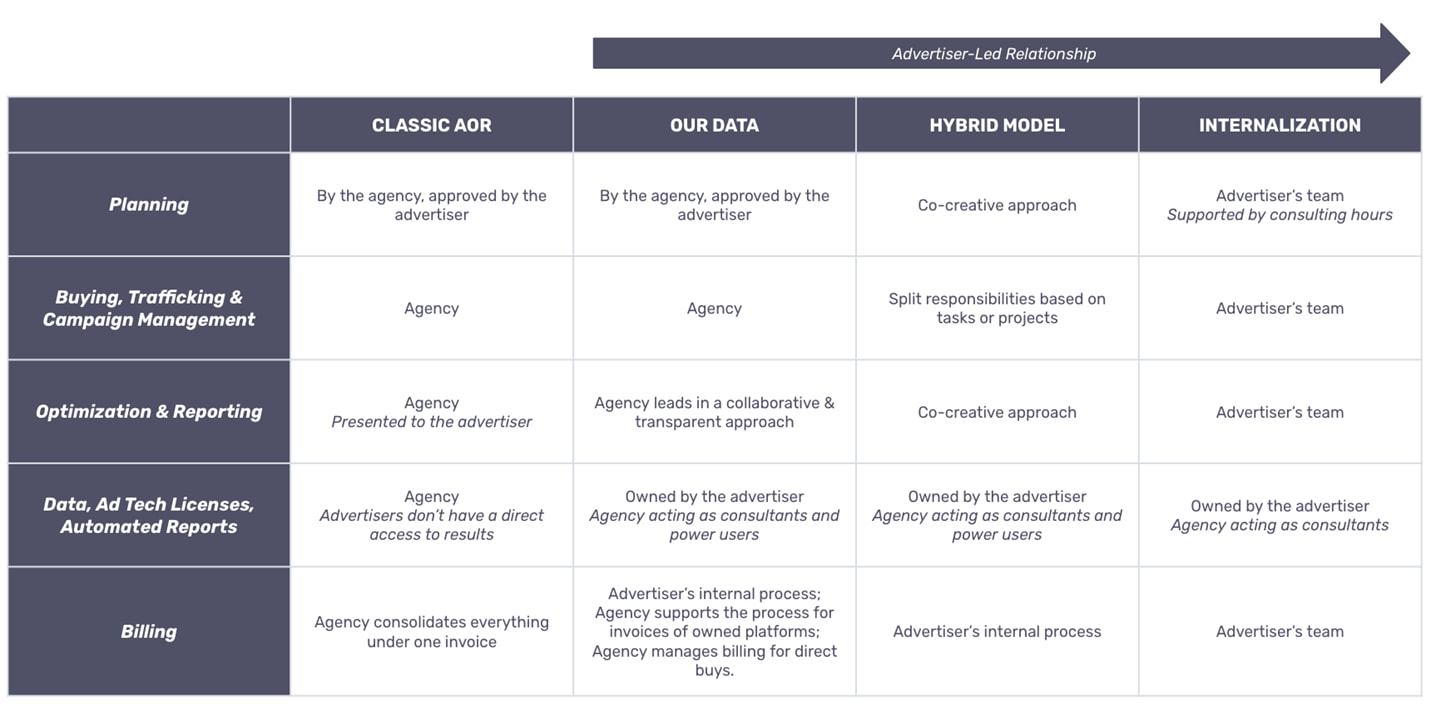Taking control of your media future
Historically, advertisers have relied on their media agency of record to provide turnkey solutions that bundled all required tools. With the democratization of paid search, paid social, programmatic buys and data management platforms, agencies built ad tech stacks to support their clients in what was a technical and expensive field. We are now a decade later, and even if some of the technologies are not as relevant as they were (DMPs for example), advertising technologies are critical to delivering quality media impressions.
It is in that context that we are now starting to see advertiser agency relationship models that represent a long continuum, from the old agency of record model to a fully internalized team, with a wide variety of hybrid models in between. All these advertiser-led relationship models share the desire for more transparency and more influence in their activity. One of the main similarities between these models is the ownership of the tech stack by the advertiser, which improves transparency and customizability, giving complete control and ownership of the data.
Radical transparency
For many agencies, transparency is about eliminating hidden fees and having a clear business model. Of course, these are part of a transparent relationship and are facilitated when the advertiser owns the licenses. The case here is direct and obvious. When your client has full access to the platform, you can’t hide anything. However, transparency is about a lot more than remuneration models.
Transparency is giving real-time access to the results of campaigns. Transparency is participating in the implementation and the decisions made. Transparency is simplifying the complex, explaining the details. Transparency is sharing the good, the bad and the ugly. Transparency is the ability to have tough conversations openly, with radical candor in a safe context. All of this becomes easier when barriers are removed for advertisers.
When the agency is no longer the only one selecting and operating the platform, they also share the responsibility with the advertiser. That paradigm change is the key to a ‘One Team’ approach where the agency team really works with rather than for the advertiser.
Custom implementation and processes
An agency stack is made up of technologies that were selected for multiple advertisers, in an implementation that can’t outlive the relationship between the advertiser and the agency. When advertisers select their own ad tech stack, they can not only choose the right technologies for their needs and main use cases but also implement and deploy them based on their business’s reality and processes. It becomes the responsibility of the agency to adapt their ways of working to the advertiser’s, opening the door to deeper conversations on subjects like brand safety, inventory management, responsible investments, or attribution models.
Data ownership
The ability to leverage first-party data based on customer transactions, rather than web engagements alone, provides a competitive advantage that will become even more important with third-party cookie deprecation. But for many advertisers, sharing this data with their agency for them to incorporate it in their stack represents an unacceptable risk. In some cases, audience sharing is prohibited entirely by contractual language that transfers the ownership of the data to the agency in order to incorporate it.
Only by owning the software licenses can advertisers ensure that all data is and will remain their property, with the control and automation their data requires. This ownership unleashes the data’s full potential in their marketing activities.
Together, these practices empower advertisers to build out their internal capabilities. Even if the agency team remains the principal users of the stack, the advertiser’s team will learn new skills and reduce their reliance on the agency by being more involved in the day-to-day operations. But owning the stack comes with challenges and may not be for everyone, so it is worth considering the options and finding the right scenario for your needs and level of investment.





































